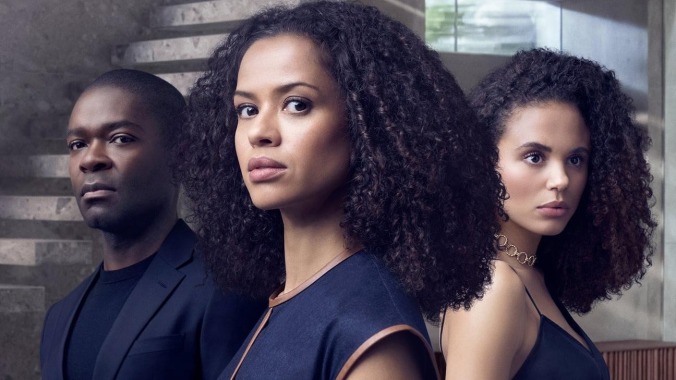Elegant architecture and erotic thrills prove irresistible in HBO Max’s The Girl Before
A minimalist dream home turns into a nightmare as Gugu Mbatha-Raw confronts traumatic pasts, smart technology, and an uncanny resemblance to Jessica Plummer


In modern liberal circles, few things are considered as uncouth as mixing up two Black people. Everything from Inside Amy Schumer to a recent episode of And Just Like That… have touched upon the utter mortification of unintentional “racial blindness,” as if such a misstep somehow has the power to expose the racist heart at the core of even the best intentioned progressive. So, it seems best to start this review with a disclaimer for those worried that they might not be able to discuss this show without risking cancellation. Yes, the two Black female characters look very similar. Yes, it is intentional. No, you aren’t (necessarily) a bigot if you regularly get confused as to which character you are looking at.
The show plays into the uncanny resemblance between actors Gugu Mbatha-Raw and Jessica Plummer, who deliver equally compelling performances as complicated, tormented women in the four-part limited series adapted from the J.P. Delaney novel. It cuts between them, three years apart, as they both go through a rigorous application process to live in a striking modern home designed by minimalist architect Edward (David Oyelowo). In order to live in the house, they have to do extensive personality quizzes, agree to be constantly surveilled within its walls, and abide by a strict set of rules including only having a single wardrobe of possessions and never leaving items on the floor. Both women are recovering from traumatic events and see the house as a fresh start and sanctuary within which to heal.
For Emma (Plummer), she is not only recovering from a violent incident, but also seems to be outgrowing her loutish partner Simon (Ben Hardy) and views the home as a place she can grow into the best version of herself. She is emotionally raw and impulsive, made more so by her uncertainty of how to comprehend what was done to her. Jane (Mbatha-Raw) is recovering from the stillbirth of her daughter Isabel, and her grief is also intermingled with guilt and confusion. And though their paths run parallel, Jane is a much sharper, more reserved figure, who keeps a cool head even when the world around her turns hostile.
One of the most interesting things about The Girl Before comes in playing with the characters’ similarities and differences. Both enter into relationships with Edward, who treats them identically, creepily giving them the same lines, the same gestures and gifts. Oyelowo may be cast against type, but he creates a fascinating, ominous figure in the meticulous architect. Edward has layers of artifice that his trauma is buried deep beneath, and he continually keeps us guessing as to whether he is an artistic genius, an unrepentant psychopath, or both.
But Edward still seems a viable option in the London of The Girl Before—despite the pristine offices and exquisite outfits, the landscape feels cursed and brimming with awful men, uncaring institutions, and unchecked injustice. And the house has the same balance of appealing and appalling, with suspended staircases, blossom trees in light wells, and smart technology that anticipates its resident’s every whim. But for those residents, this package also includes cameras watching their every move, regular inspections, and the occasional vision of their doppelgänger being murdered.
The show utilizes both the sharp brutality of the architecture and the sculptural qualities of the central trio and creates striking frames, filled with intrigue and shadow. Those are dearly needed in some of the middle-act scenes, which even the polished aesthetics and excellent performances can’t stop from becoming repetitive, particularly since so much of it is confined to a single space. While each revelation is a thrill, the show treads water while making us wait for the next one. Threats of consequences to the breaking of laws and rules never materialize, which undermines the stakes set out early in the narrative.
While there are plenty of thriller conventions that are observed, including an amount of wine drinking on par with parody series The Woman In The House Across The Street From The Girl In The Window, the series still proves more artful than most entries in the genre. Many of its larger plot points and mysteries are predictably resolved (made more predictable still by a small cast that provides a limited number of solutions), but the series shines best when it takes a step back from the twists and turns and settles into character study. It also does well when it leans heavier into the “erotic” side of erotic thriller, and Oyelowo has intense chemistry with both Mbatha-Raw and Plummer.
As a genre, the erotic thriller has been underserved since its heyday in the ’90s, but seeing actors of Oyelowo and Mbatha-Raw’s caliber in a steamy new entry bodes well for its future—and perhaps speaks to the way that it could continue to thrive. In the future, the erotic thriller could delve deep into trauma, redemption, and three-dimensional, complicated female characters whose failures and triumphs aren’t defined by their effect on the men around them. That, like in The Girl Before, no matter how similar two characters look, they are written and performed well enough that they remain (mostly) distinct from one another, and are afforded agency in their own narratives while being lavished with impressively stylish direction.